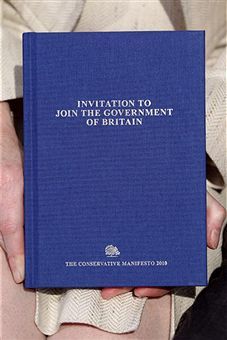 Whatever your political leanings, it is hard to deny that the Tories won the Big Idea
Competition. The Labour Party offered a series of unconnected (if occasionally innovative) initiatives. But they lacked coherence. Their manifesto had what Peter Mandelson called “Blair
Plus”, but also what could be referred to as “Prescott Squared”. “What’s The Big Idea?” asked Sky’s Niall Paterson. The Tories on the other hand have a Big Idea
– decentralisation. Giving power to citizens in a number of different ways. It is a concept that gives shape to the Tory manifesto, providing a ready stock of sound-bites.
Whatever your political leanings, it is hard to deny that the Tories won the Big Idea
Competition. The Labour Party offered a series of unconnected (if occasionally innovative) initiatives. But they lacked coherence. Their manifesto had what Peter Mandelson called “Blair
Plus”, but also what could be referred to as “Prescott Squared”. “What’s The Big Idea?” asked Sky’s Niall Paterson. The Tories on the other hand have a Big Idea
– decentralisation. Giving power to citizens in a number of different ways. It is a concept that gives shape to the Tory manifesto, providing a ready stock of sound-bites.
But why do we need Big Ideas, as opposed to just Good Ideas? When Henry Ford took inspiration from slaughterhouses’ overhead trolleys to build his assembly line, increasing annual production, he did not go around saying self-consciously: “I have had Big Idea.” During the Cold War there were two Big Ideas – one was liberal democracy the other communism. It did not get any bigger. But nobody talked about them as Big Ideas.
Why is it different now? OK, parties need them to feed lines to politicians who have to go on Newsnight and the Today Programme and sound coherent. But is that all?
Partly, I suspect, the obsession with a Big Idea comes because the really Big Idea Competition was called off years ago as the Right and the Left merged each of their Big Ideas into a new one, the liberal, socially-conscious, capitalist democracy, which underpinned politics for 30 years after 1945. This period was interrupted by stagflation, taxpayer revolts, fiscal crisis and a revival of free-market ideas. For the next 20 years, Thatcherism was in vogue. Then came the Third Way, a hard-edged version of Social Democracy. Now, nobody is sure what to believe – what with everyone relying on tax-payers to help them out, whether they are bankers or industrialists. Being able to end the electorate’s disorientation is itself a vote-winner.
Is David Cameron’s Big Idea big enough to do that – and to one day earn a place in the pantheon of societal concepts, from Keynesianism, Thatcherism, and Blairism? What do you think?






Comments